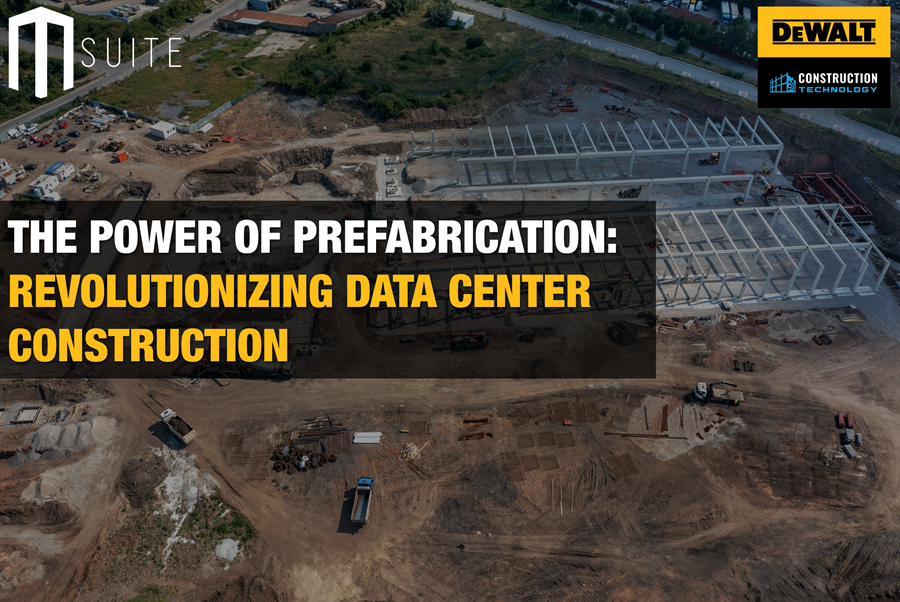The world of technology is fast-paced, and data centers serve as the beating heart of our digital infrastructure. These massive facilities house the servers, networking equipment, and storage systems that keep our online world running smoothly. However, constructing data centers is a considerable feat. It requires meticulous planning, significant resources, and precise execution. The construction industry has recently turned to prefabrication as a game-changer in streamlining the process, enhancing efficiency, and ensuring quality in data center construction.
Prefabrication, or off-site construction, involves manufacturing modules, packages, or components in a controlled environment away from the site. These components are then transported to the site and assembled, reducing on-site construction time and minimizing disruptions. While prefabrication has been used in various industries for decades, its application in data center construction has gained significant traction due to the unique demands of these facilities.
Prefabrication Offers Speed and Precision for Data Center Construction
One key benefit of prefabrication in data center construction is speed. Traditional construction often involves lengthy on-site processes, including pouring concrete, erecting steel structures, and installing equipment. Prefabrication allows for simultaneous off-site manufacturing and on-site preparation, significantly reducing construction timelines. With the exponential growth of data and the constant demand for new data center capacity, speed is of the essence in meeting market demands.
Moreover, prefabrication offers greater precision and quality control than traditional construction methods. Building elements are manufactured in the controlled environment of a fab shop using advanced technology and automation systems. This ensures consistency in dimensions, structural integrity, and adherence to design specifications. In an industry where even minor deviations can have significant consequences, such as compromised cooling efficiency or electrical performance, the precision offered by prefabrication is invaluable.
Prefabrication Enables Leveraging Economies of Scale for Data Center Builders
Prefabrication enables data center developers to leverage economies of scale and optimize resource utilization. Developers can save costs by standardizing building components and leveraging bulk purchasing power without compromising quality. Furthermore, off-site manufacturing reduces material waste, as components can be precisely engineered to minimize excess materials. This benefits bottom-line profits and can help achieve sustainability targets in modern construction.
The modular nature of prefabrication also offers scalability and flexibility, allowing data center operators to adapt to changing demands quickly. Rather than constructing entire facilities from scratch, modular components can be added or modified to accommodate increased capacity or new technological requirements. This agility is essential in an industry where rapid innovation and evolving user needs drive constant change.
Prefabrication also enhances safety on construction sites, a critical concern in the high-risk environment of data center construction. By minimizing on-site activities and reducing exposure to potential hazards, such as falls, accidents, and adverse weather conditions, prefabrication helps create a safer working environment for construction workers. Additionally, the controlled conditions of off-site manufacturing contribute to better ergonomics and fewer workplace injuries.
Prefabrication offers Improved Energy Efficiency and Sustainability
One of the most significant advantages of prefabrication in data center construction is the potential for improved energy efficiency and sustainability. Modern data centers consume vast energy to power and cool the servers, leading to significant environmental impacts. Prefabricated components can be designed with energy-efficient features, such as advanced insulation, optimized airflow management, and integrated renewable energy systems. By incorporating sustainable design principles into prefabricated modules, data center developers can reduce operational costs and minimize their carbon footprint.
Supporting Circular Economy Principles
Furthermore, prefabrication supports circular economy principles by facilitating the reuse, repurposing, or recycling of building components. At the end of a data center’s lifecycle, modular components can be disassembled and repurposed for other projects, minimizing waste and maximizing resource efficiency. This cradle-to-cradle approach aligns with the growing emphasis on sustainability and responsible resource management in the construction industry.
Prefabrication Requires Experience and Expertise
Despite its numerous benefits, prefabrication in data center construction is challenging. Designing and manufacturing complex building components require advanced engineering expertise and specialized facilities. Coordination between multiple stakeholders, including architects, engineers, contractors, and manufacturers, ensures seamless integration of prefabricated modules into the overall construction process. Additionally, transportation logistics and site access limitations can pose logistical challenges, particularly for large-scale projects in urban areas or remote locations.
However, the benefits of prefabrication far outweigh these negatives, making it a profitable option for data center construction projects. As the demand for data continues to grow exponentially, the need for efficient, scalable, and sustainable data center infrastructure will only increase. Prefabrication addresses these needs while enhancing speed, quality, safety, and environmental performance.
Prefabrication Revolutionizes Data Center Construction
Prefabrication revolutionizes data center construction by offering a faster, more efficient, and sustainable alternative to traditional building methods. By leveraging off-site manufacturing, modular design, and advanced technologies, data center developers can meet the ever-increasing demands of the digital age while minimizing costs, reducing environmental impact, and ensuring the highest standards of quality and safety. As technology continues to evolve, prefabrication will expand its role in shaping the future of data center infrastructure.
Leveraging Fabrication Operations Management Technology
MSUITE, a leading fabrication shop technology provider, offers advanced solutions to enhance efficiency and productivity in fabrication shops, thereby supporting data center builders in increasing throughput. Let’s explore how MSUITE can facilitate this:
Streamlined Workflows: MSUITE’s software streamlines workflows in fabrication shops by digitizing and automating various processes, from project planning to fabrication and installation. By eliminating manual paperwork and reducing administrative overhead, MSUITE enables fabricators to focus on core activities, ultimately increasing throughput.
- Real-time Data Visibility: MSUITE provides real-time visibility into fabrication shop operations, allowing data center builders to monitor progress, track inventory levels, and identify potential bottlenecks. With accurate, up-to-date information, project or shop managers can make data-driven resource allocation and workflow sequencing decisions, thus maximizing throughput.
- Resource Optimization: MSUITE helps data center builders optimize resource utilization in fabrication shops by effectively managing equipment, materials, and labor. Through advanced scheduling algorithms and predictive analytics, MSUITE allocates resources efficiently, minimizing idle time and maximizing productivity.
- Quality Assurance: MSUITE includes quality assurance tools that enable fabricators to maintain the highest quality standards throughout fabrication. By implementing automated quality checks and inspections, MSUITE helps identify and address issues early, reducing rework and ensuring that fabricated components meet specifications the first time, thereby avoiding delays in the construction schedule.
- Collaboration and Communication: MSUITE facilitates cooperation and communication among stakeholders within the fabrication shop and the entire construction project. By providing a centralized and single platform for sharing info, communicating changes, and resolving issues in real-time, MSUITE fosters greater coordination and alignment, reducing misunderstandings and delays that can impact throughput.
- Integration with BIM and ERP Systems: MSUITE seamlessly integrates with Building Information Modeling (BIM) and Enterprise Resource Planning (ERP) systems, enabling data center builders to leverage existing data and workflows. By connecting fabrication shop activities with the broader project ecosystem, MSUITE ensures continuity and alignment throughout the construction lifecycle, facilitating faster decision-making and smoother execution.
- Training and Support: MSUITE offers comprehensive training and support to help data center builders maximize the value of its technology solutions. Through hands-on training, online resources, and dedicated customer support, MSUITE ensures that fabricators have the knowledge and expertise to fully leverage its tools and optimize throughput in their fabrication shops.
MSUITE is crucial in increasing throughput in fabrication shops to support data center builders and contractors. By digitizing workflows, providing real-time visibility, optimizing resource utilization, ensuring quality assurance, facilitating collaboration, integrating with existing systems, and offering training and support, MSUITE empowers fabricators to enhance efficiency and productivity and deliver projects on time and within budget. With MSUITE as a trusted partner, data center builders can confidently meet the growing demand for high-quality, reliable infrastructure in today’s digital age.







